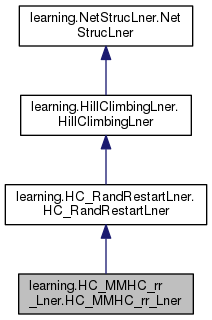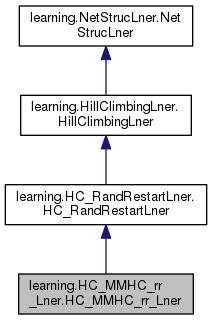|
| def | __init__ (self, states_df, score_type, max_num_mtries, alpha=0, num_starts=10, ess=1.0, verbose=False, vtx_to_states=None) |
| |
| def | move_approved (self, move) |
| |
 Public Member Functions inherited from learning.HC_RandRestartLner.HC_RandRestartLner Public Member Functions inherited from learning.HC_RandRestartLner.HC_RandRestartLner |
| def | __init__ (self, states_df, score_type, max_num_mtries, num_starts=10, ess=1.0, verbose=False, vtx_to_states=None) |
| |
| def | restart (self, mtry_num) |
| |
| def | cache_this (self, move, score_change) |
| |
| def | empty_cache (self) |
| |
| def | __init__ (self, states_df, score_type, max_num_mtries, ess=1.0, verbose=False, vtx_to_states=None) |
| |
| def | climb (self) |
| |
| def | do_move (self, move, score_change, do_finish=True) |
| |
| def | refresh_nx_graph (self) |
| |
| def | would_create_cycle (self, move) |
| |
| def | move_approved (self, move) |
| |
| def | finish_do_move (self, move) |
| |
| def | restart (self, mtry_num) |
| |
| def | cache_this (self, move, score_change) |
| |
| def | empty_cache (self) |
| |
| def | __init__ (self, is_quantum, states_df, vtx_to_states=None) |
| |
| def | fill_bnet_with_parents (self, vtx_to_parents) |
| |
The class HC_MMHC_rr_Lner (Hill Climbing Min-Max Hill Climbing Random
Restart Learner) is a child of HC_RandomRestartLner. It adds to the
latter a search at the beginning of the learning process of the PC (
parents children, aka neighbors) set of each node. This knowledge is
then used in the move_allowed() function to forbid any 'add' moves
unless they add arrows compatible with the PC list of each node.
References
----------
1. Tsamardinos I, Brown LE, Aliferis CF (2006). "The Max-Min
Hill-Climbing Bayesian Network Structure Learning Algorithm". Machine
Learning, 65(1), 31-78.
Attributes
----------
is_quantum : bool
True for quantum bnets amd False for classical bnets
bnet : BayesNet
a BayesNet in which we store what is learned
states_df : pandas.DataFrame
a Pandas DataFrame with training data. column = node and row =
sample. Each row/sample gives the state of the col/node.
ord_nodes : list[DirectedNode]
a list of DirectedNode's named and in the same order as the column
labels of self.states_df.
max_num_mtries : int
maximum number of move tries
nx_graph : networkx.DiGraph
a networkx directed graph used to store arrows
score_type : str
score type, either 'LL', 'BIC, 'AIC', 'BDEU' or 'K2'
scorer : NetStrucScorer
object of NetStrucScorer class that keeps a running record of scores
verbose : bool
True for this prints a running commentary to console
vertices : list[str]
list of vertices (node names). Same as states_df.columns
vtx_to_parents : dict[str, list[str]]
dictionary mapping each vertex to a list of its parents's names
mcache : list[tuple[str, str, str]]
a list that stores all moves of a try. This list is cleared at
beginning of each try.
score_ch_cache : list[tuple[float, float, float]]
A list that stores the score changes of each move of a try. Score
changes here are given as a 3-tuple of 3 floats, (beg_score_ch,
end_score_ch, tot_score_ch).
best_start_graph : networkx.DiGraph
best_start_score : float
Each time restart() function is called, the current tot score is
compared with best_start_score, and if it is higher, then both the
current nx_graph and its score are stored in best_start_graph and
best_start_score.
cur_start : int
current start. Increases by one every time restart() is called.
num_starts : int
number of starts. Number of times minus 1 that restart function is
called.
vtx_to_nbors : dict[str, list[str]]
a dictionary mapping each vertex to a list of its neighbors. The
literature also calls the set of neighbors of a vertex its PC (
parents-children) set.
alpha : float
threshold used for deciding whether a conditional or unconditional
mutual info is said to be close to zero (independence) or not (
dependence). The error in a data entropy is on the order of ln(n+1)
- ln(n) \approx 1/n where n is the number of samples so 5/n is a
good default value for alpha. 



 Public Member Functions inherited from learning.HC_RandRestartLner.HC_RandRestartLner
Public Member Functions inherited from learning.HC_RandRestartLner.HC_RandRestartLner Public Member Functions inherited from learning.HillClimbingLner.HillClimbingLner
Public Member Functions inherited from learning.HillClimbingLner.HillClimbingLner Public Member Functions inherited from learning.NetStrucLner.NetStrucLner
Public Member Functions inherited from learning.NetStrucLner.NetStrucLner Public Attributes inherited from learning.HC_RandRestartLner.HC_RandRestartLner
Public Attributes inherited from learning.HC_RandRestartLner.HC_RandRestartLner Public Attributes inherited from learning.HillClimbingLner.HillClimbingLner
Public Attributes inherited from learning.HillClimbingLner.HillClimbingLner Public Attributes inherited from learning.NetStrucLner.NetStrucLner
Public Attributes inherited from learning.NetStrucLner.NetStrucLner Static Public Member Functions inherited from learning.HillClimbingLner.HillClimbingLner
Static Public Member Functions inherited from learning.HillClimbingLner.HillClimbingLner Static Public Member Functions inherited from learning.NetStrucLner.NetStrucLner
Static Public Member Functions inherited from learning.NetStrucLner.NetStrucLner 1.8.11
1.8.11